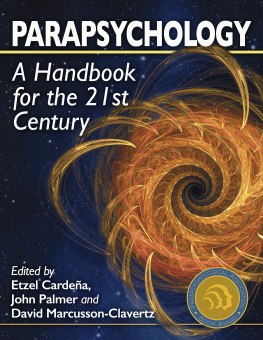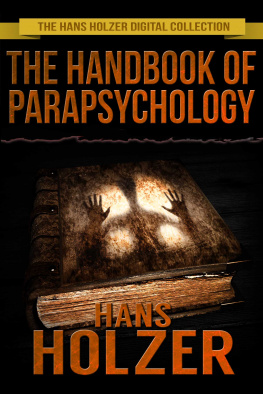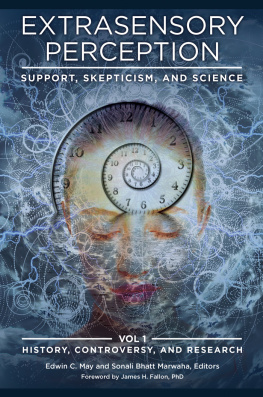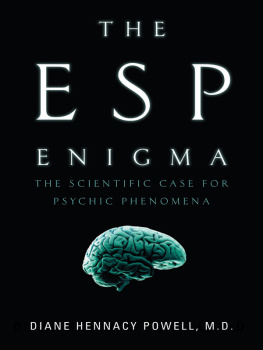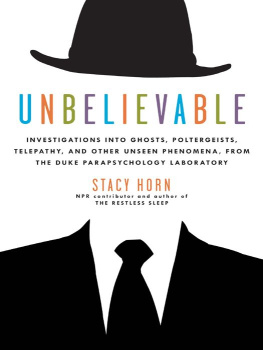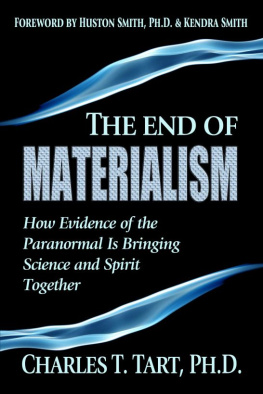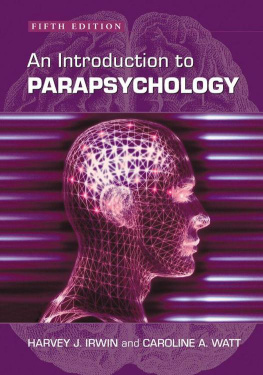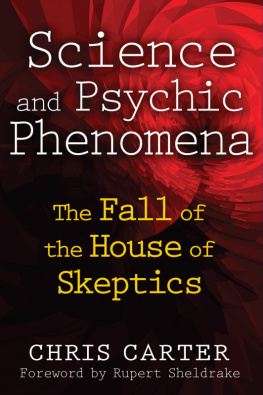
Parapsychology
A Handbook for the 21st Century
Edited by Etzel Cardea, John Palmer and David Marcusson-Clavertz

McFarland & Company, Inc., Publishers
Jefferson, North Carolina
LIBRARY OF CONGRESS CATALOGUING DATA ARE AVAILABLE
BRITISH LIBRARY CATALOGUING DATA ARE AVAILABLE
e-ISBN: 978-1-4766-2105-0
2015 Etzel Cardea, John Palmer and David Marcusson-Clavertz. All rights reserved
No part of this book may be reproduced or transmitted in any form or by any means, electronic or mechanical, including photocopying or recording, or by any information storage and retrieval system, without permission in writing from the publisher.
Cover image 2015 Petr Vaclavek/Dreamstime
McFarland & Company, Inc., Publishers
Box 611, Jefferson, North Carolina 28640
www.mcfarlandpub.com
The editors dedicate this volume to the memory of the
SPR pioneers in the study of psi phenomena, including such
luminaries as William James and Eleanor Sidgwick, and to
two more recent pathbreakers, William Braud
and Robert L. Morris.
Etzel Cardea also dedicates the book to his beloved,
the perennially precious playful poet and
psychologist Sophie Reijman, and to all beessies
who are part of the unveiled reality.
Preface
Reintroducing Parapsychology
ETZEL CARDEA, DAVID MARCUSSON-CLAVERTZ and JOHN PALMER
The report of my death was an exaggeration.Mark Twain, May 31, 1897
Parapsychology is the scientific study of ostensible parapsychological phenomena such as telepathy and psychokinesis (see below). As with the report of the death of the great ironist Mark Twain while he was alive, the reports about the demise of parapsychology (e.g., Hyman, 2010) have been greatly exaggerated. There are at least three good reasons why this is the case.
First, reports of meaningful and extraordinary events such as Mark Twains dream that seemed to anticipate in detail the death of his brother (Kripal, 2014), or in which some individuals seem to have precise knowledge not attributable to their senses or logical reasoning (e.g., Lloyd Mayer, 2007) continue to occur and are widespread across the globe (Watt & Tierney, 2014). When one inquires, it is not unusual to have people mention that they seem to have extraordinary coincidences with someone close to them, or that they dreamed about an event that happened in the future but could not have been reasonably anticipated. Although some of these experiences may be the result of selective reporting or a bad estimate of probabilities, others can hardly be explained away as mere coincidence, even considering the law of large numbers and the occurrence of very unusual events just by chance (cf. Dyson, 2004; see also chapter 27, this volume). From its onset as a scientific discipline, parapsychology (or psychical research) considered chance as an alternative explanation and rejected it only after evaluating its probability (Holt, Simmonds-Moore, Luke, & French, 2012). It is thus not surprising that psi phenomena are seriously contemplated not only in science but also in art and culture at large (Cardea, Iribas, & Reijman, 2012; chapter 30, this volume).
Second, as most of the chapters in this volume attest, there are various parapsychology research paradigms (e.g., ganzfeld, dream, remote viewing, presentiment) that control for chance and support the existence of psi phenomena using the same criteria as those for mainstream topics. Even Richard Wiseman, a foremost critic of parapsychology, is on record stating that by the standards of any other area of science remote viewing is proven (http://www.dailymail.co.uk/news/article-510762/Could-proof-theory-ALL-psychic.html).
Third, although some parapsychology critics have been vociferous and often persecuted those who dare to conduct research in the area, previous surveys and a recent letter written by 100 academics show that many researchers have not been persuaded by their rhetoric (Cardea, 2011, 2014). Furthermore, a number of recent books have taken these critics to task for their double standards and misrepresentation of the results of psi research (e.g., McLuhan, 2010; Storr, 2013).
These arguments do not deny that the field faces considerable challenges including lack of funding and gaining greater acceptance as a topic of investigation (McClenon, 1982), but they reject an unjustified closure of phenomena that continue to interest both laypeople and scientists, and have important theoretical and practical implications. Although we are far from having a full understanding of psi phenomena or being able to provide a perfectly replicable experiment, there have been a number of empirical and theoretical advances in the last few decades, described in this book.
What Is Parapsychology?
To communicate and transact with the world, humans use a number of senses to gain information from it and muscles to act upon it. Commonly reported, however, are experiences of phenomena in which information or energy seems to have been apprehended or transferred without the operation of the known senses or logical inference, and these are usually referred to as psi phenomena (Bem & Honorton, 1994). Parapsychology is the scientific study of these phenomena, and it includes consideration of both common psychological explanations (e.g., inferential mistakes) as well as explanations in which mind may be a basic, irreducible aspect of reality (cf. Nagel, 2012) that may transcend the perceived limitations of the body (Sidgwick, 1932). Prospective research not only on psi but on near-death experiences (e.g., Parnia et al., 2014) suggests that the relation between the brain and the mind is far more complex than the usual brain creates mind dictum [chapter 2, this volume].
Traditionally, psi phenomena have been classified according to the ostensible source and direction of the communication. In telepathy, information appears to be received directly from another mind, such as sensing that a loved one is calling for help from a distance. In clairvoyance, information appears to be received from a distant event or object, such as sensing that there is a fire in another city in the absence of any news about it. In precognition information appears to be received from a future event, such as dreaming about a disaster that occurs later that same day. In retrocognition, a person may seem to know what occurred in the past without using the senses or logic, as in providing precise information about a crime that occurred earlier. It is worth mentioning that retrocognition and precognition are not orthogonal to clairvoyance or telepathy since an experience could be labeled as either precognitiveclairvoyant or precognitivetelepathic. It is common to group these categories as forms of extrasensory perception or ESP. In psychokinesis (PK) it appears that our minds have a direct energetic effect on matter, such as a watch stopping at the time of someones death. Parapsychology also includes the scientific study of the possibility of survival of consciousness after bodily death, such as apparent communication with a deceased person or memories of a past life.
Some of these labels have been criticized for being burdened with theoretical assumptions about the underlying mechanism (May, Utts, & Spottiswoode, 1995; Palmer, 1992), and since there is debate as to the nature of psi, it may be advisable to use more neutral terms. For instance, the term extrasensory perception implies that there is a
Next page
